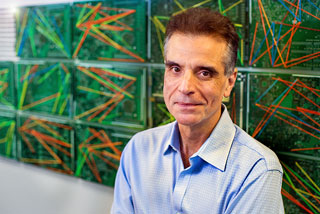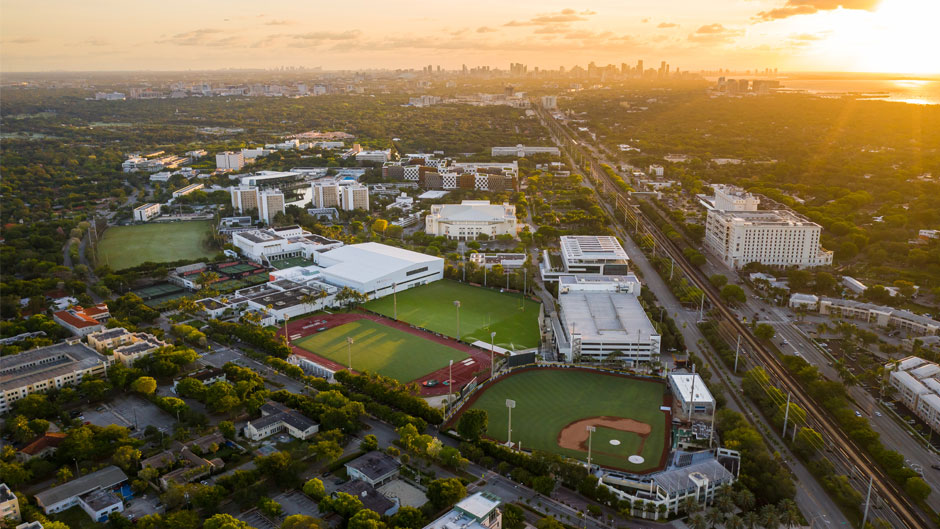When the University of Miami launched the Center for Computational Science in 2007, hoping it would become the central hub for the high-performance computing and software engineering needed to elevate the University’s problem-solving research, the endeavor was considered an experiment.
“It was the only enterprise that spanned multiple campuses, and we didn’t know if it was going to work,” said Nick Tsinoremas, the founding director of the center, which last year evolved into the Institute for Data Science and Computing (IDSC) with an important mission: to transform the University into a global epicenter of data science through research, education, ethics, and workforce training.
Now, IDSC has attracted a combined $12 million endowment from two philanthropic titans—the John S. and James L. Knight Foundation and Phillip and Patricia Frost—to recruit the innovators and thought leaders who, enticed by a research computing infrastructure unlike that at any other academic institution, will help put the University at the center of the data revolution and propel Miami’s emergence as an international tech hub.
“Think of this as high-test fuel. The Knight Foundation’s gift supporting IDSC’s growth will top off our tank and allow us to go further and go faster,” said Jeffrey L. Duerk, the University’s executive vice president for academic affairs and provost. “One of the most important opportunities for the world right now is to harness the power of data science to understand complicated problems and find great solutions. This accelerates our ability to do that. While the internet powered the last tech revolution, data science, machine learning, and artificial intelligence will drive the next one. Our partnerships with the Frosts and the Knight Foundation provide us new opportunities to lead this new revolution.”
Recognizing that nurturing, retaining, and attracting talent is key to advancing Miami’s burgeoning technology sector, the Knight Foundation announced Wednesday that it is committing $4.3 million toward the creation of six endowed faculty Knight chairs at IDSC, the second of a planned group of affiliated research enterprises that will fall under the umbrella of the Frost Institutes for Science and Engineering.
“This investment in IDSC demonstrates the Knight Foundation’s commitment to transformative philanthropy,” noted University of Miami President Julio Frenk. “As the University of Miami embraces this turning point in the evolution of technology—catalyzing data-intensive research to solve pressing societal problems—we are grateful for the support of partners like the Knight Foundation and the Frosts.”
In combination with Knight-endowed funds already held by the University, the gift unlocks an additional $6 million in matching funds from the Frosts, who launched the Frost Institutes in 2017 with a $100 million gift. The match from the University’s longtime benefactors brings the total endowment for the six Knight chairs at IDSC to more than $12 million.
“Demand for technical talent is rising, and we’re just at the beginning of the trajectory,” said Alberto Ibargüen, Knight Foundation president and CEO. “These investments will assure that there will be a deep pool of talent for Miami’s growing tech sector while creating opportunities for Miamians of all backgrounds.”
Knight’s newest investments, which also include gifts to Florida International University to expand its School of Computing and Information Sciences and to Baptist Health South Florida to create a fellowship in health care technology, bring the amount to more than $55 million that the foundation has committed to Miami’s emerging tech entrepreneurship ecosystem since 2012. The latest commitments also mark the foundation’s evolution to supporting institutional partners that can develop technical talent at scale and meet the demands of local industry—a primary goal of government leaders.
“Miami is emerging as the next great global tech hub. Miami’s people are its greatest asset, and great tech hubs can only be built with great university partners,” said Miami Mayor Francis Suarez. “The University of Miami will be a key part in creating the next generation of innovators and a workforce that will secure Miami’s place at the forefront of technology and innovation.”
“This $12 million dollar endowment is not just a remarkable act of philanthropy, it’s an investment in the future of our economy and of our workforce, propelling forward our community’s growth as a global tech and innovation hub,” noted Miami-Dade County Mayor Daniella Levine Cava.

The initial endowed chairs, said Tsinoremas, who serves as IDSC director and vice provost for research computing and data, are likely to include leading scholars and innovators in artificial intelligence and machine learning with applications centered on smart homes, smart cities, and digital health. Their presence, he added, will not only draw more renowned technological expertise to the University but help the institution infuse data science into every instructional program. This will ensure that every student, from music to math majors, graduates with a degree of data-savviness—if not a new master’s in data science. Launched last fall with 15 students, the new degree program, which has tracks in technical data science, data visualization, smart cities, and marine and atmospheric science, has more than 40 applicants for this fall.
But the most vital role of the IDSC chairs will be to bring new ideas and insights to the highly skilled and collaborative data scientists already at the heart of the institute and catalyze research that will generate a new wave of data-informed practices and solutions to real-world problems in nearly every realm—from medicine to earth sciences, urban planning to digital humanities, and business to communication.
“Data is everywhere. Everybody is creating and using it. The question is how can we use it as an asset?” Tsinoremas asked. “How can we use it better? How can we develop new capabilities to address issues we are facing? And what are our responsibilities? How can we ensure the data is secure? That we are using it ethically?”
An international leader in computational genomics and bioinformatics, Tsinoremas is confident that the University’s investments will attract the new talent cluster that will help answer those questions and drive data science research, applications, and training to new heights. Just over the past few years, the University installed Triton, one of the fastest supercomputers in the nation, customized for the University by IBM, that can process artificial intelligence and machine-learning workloads in real time.
It also became the first university to begin deploying AT&T’s 5G+ and Multi-access Edge Computing technology, which will deliver more data, from the internet to wireless devices at a faster pace. And, it has invested nearly $5 million in the University of Miami Laboratory for Integrative Knowledge, a key element of the University’s Roadmap to Our Next Century aimed at nurturing the cross-campus collaborations the University envisioned when it recruited Tsinoremas to launch its fledgling “experiment” just 13 years ago.
“Everybody talks about San Francisco and Boston, but Miami will soon be mentioned in the same context because these gifts will allow us to reach our potential faster,” he said. “And speed is important, because the speed of the computer doubles every year. We’ve already brought together the infrastructure and the latest in technology, and now we’re bringing in more intellectual capital to create the superstructure that will catalyze the transformation of our region.”

